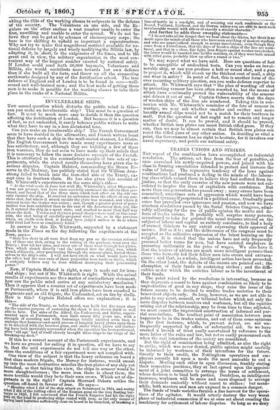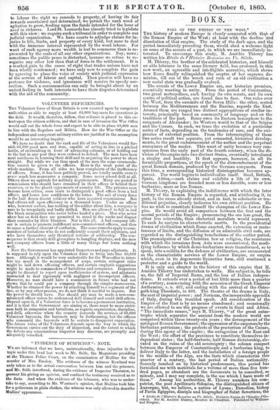TRADES UNIONS AND STRIKES.
TirE repeal of the combination laws accomplished an industrial revolution. The artisan, set free from the fear of penalties, at once exercised his newly-acquired powers, and joined with his class in forming associations intended to protect and increase the value of labour. The repressive tendency of the laws against combinations had produced a feeling in the minds of the labour- ing class which caused them to believe they had suffered from in- justice, so that the early exercise of the new powers were not cal- culated to inspire the class of capitalists with confidence. But more than one generation has passed away ; many errors have been committed, sometimes acts of oppression which would have been esteemed tyranny if perpetrated in a political cause. Gradually good sense has prevailed over ignorance and passion, and now we have nineteen resolutions passed by the Social Science Congress, admi- rably adjusting for the use of public opinion the merits and de- fects of trades unions. It probably will surprise many _persons, accustomed to take for granted the usual truisms uttered on the subject of labour and capital as entirely conclusive, to find-a body of earnest thinkers to any extent expressing their approval of unions. But so it is ; and the deliverance of the congress must be accepted as the collective expression of the latest learning on the subject. It is stated that the unions have not only frequently procured better terms for men, but have assisted employers in procuring uniformity in the price of wages. We also have it that the leaders of unions are much more intelligent persons than those who formerly led their fellow men into errors and extrava- gance ; and that, as a whole, intelligent action has been promoted. On the other hand, the defeots of the unions are pointed out; the absorption of their funds in sustaining strikes ; and the diffi- culties under which the societies labour as to the investment of their funds.
The point raised by the resolutions is interesting, because as
they deprecate a resort to laws against combination as likely to be unproductive of good in any shape, they raise the issue of the future means to be devised to confine trades societies to their benevolent objects only. So long, however, as we are not able to point to any court, council, or tribunal before which not only the mere disputes between masters and workmen, but all the equities arising out of the relationship, may be from time to time adjusted, we must expect the improvised construction of informal and par- tial associations. The readiest point of association between men happens to be in the trades unions, and out of them come opinions in the first instance, which, to prevent defeat, are not un- frequently supported by offers of substantial aid. So we have created a breach of trust easily ascertained by reference to the mere letter of the rules and law, but not so easily pronounced such when the real intentions of the society are considered.
But the right of combination being admitted, as also the right to strike, which was never denied, public opinion might usefully be informed- by workmen of their intentions for the future. Greatly to their credit, the Nottingham operatives and em- ployers recently hit upon a mode the most amicable to end a dispute. Meeting each other in open discussion, frankly stating their respective positions, they at last agreed upon the appoint- ment of a joint committee to arrange the terms of settlement, whose decision is to bind both parties. Doubtless, as intelligence increases, workmen will be more and more disposed to arrange their demands amicably without resort to strikes; but mean- while, both masters and men are exposed to a common danger. The funds of trade societies furnish a fine harvest for the opera- tions of the agitator. It would utterly destroy the very worst phase of industrial commotion if we at once set about creating the machinery for settlement of labour disputes. So long as we deny
to labour the right we concede to property, of having its fair rewards ascertained and determined, we permit the rank weed of agitation to grow, feeding upon the funds intended for the hour of need in sickness. Lord St. Leonards has already tried to legislate with this view : we require such a tribunal in order to complete our judicial organization. We have courts to adjudge claims for in- juries to life, limbs, and property of every kind, but none to deal with the immense interest represented by the word labour. For want of such agency more wealth is lost to commerce than is re- presented by the costs of all our other organizations. Nay, more ; sometimes the public peace is disturbed, because we refuse to re- cognize any other law than that of force in the settlement. It is a marked gain to the cause of right that trades unions have not been wholly condemned ; we have only now to complete the gain by agreeing to place the voice of society with judicial expression at the service of labour and capital. Then passion will have no pretence for violence, and ignorance will receive its speedy cor- rection. Such a consummation can only be brought about by an united feeling in both interests to have their disputes determined with the aid of the community.



























 Previous page
Previous page